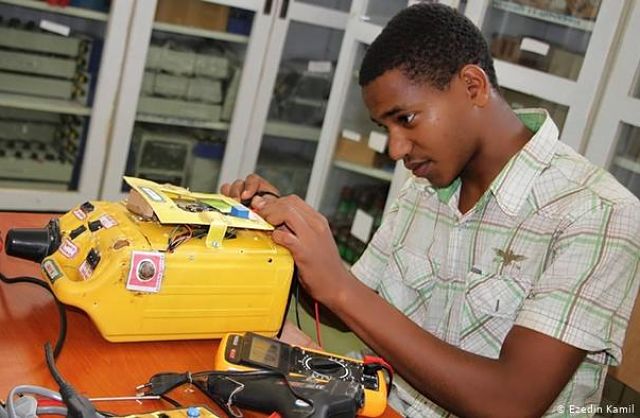 "When I heard about the global shortage and the high price of ventilators [$30,000, €27,613 each], I thought about building them myself," an 18-year-old natural science student from Welkite, told DW. "Ethiopia used to import those machines, but I didn't think foreign countries would help us at this time." (DW)
"When I heard about the global shortage and the high price of ventilators [$30,000, €27,613 each], I thought about building them myself," an 18-year-old natural science student from Welkite, told DW. "Ethiopia used to import those machines, but I didn't think foreign countries would help us at this time." (DW)
By Tsehay Chanie
Updated: May 5th, 2020
Since the outbreak of the coronavirus pandemic, ventilators, face masks and gloves have become much-sought-after items around the globe. Sourcing medical and personal protection equipment is a huge problem for poorer countries such as Ethiopia.
The pandemic has spurred on creative minds, though, including that of Ezedine Kamil, an 18-year-old natural science student from Welkite, a rural town 160 kilometres from the Ethiopian capital, Addis Ababa.
Contact-free hand washer
Ezedine has 30 inventions to his credit so far. Thirteen have been patented by the organization SaveIdeas.
The onslaught of the virus presented a unique opportunity to Ezedine. He first designed an contactless electrical soap dispenser with a built-in sensor, which could also be operated using a mechanical pedal during power blackouts — common occurrences in Ethiopia.
Ezedine said his invention has been embraced by the local community. Fifty dispensers have been produced by the local university and distributed in banks and hospitals across Welkite.
Ventilator shortage
Ventilators, which help patients breathe, are in even greater demand. Ethiopia has only 557 ventilators, according to the country’s health ministry, 214 of which belong to private hospitals. That leaves just 163 ventilators for COVID-19 patients — too few for Africa’s second most populous nation.
“When I heard about the global shortage and the high price of ventilators [$30,000, €27,613 each], I thought about building them myself,” Ezedin told DW. “Ethiopia used to import those machines, but I didn’t think foreign countries would help us at this time.”
Having never built a ventilator, he set off by searching open source manuals online. His invention used a plastic pouch known as an Ambu bag, a mechanical ventilator and a screen operated from a cellphone.
After successfully testing a prototype, he started producing and delivering the new machines to the local community.
Coronavirus warning
Next, the young inventor set about building a device to remind people not to touch their faces, one of the central massages of the global coronavirus awareness campaign.
“The device is like a watch with a sensor,” Ezedine told DW. “Every time the hand approaches the face, the device rings, reminding the wearer not to touch their face.”
The device is made out of easily available, discarded electrical appliances and plastic materials which cannot decay easily. He described the gadget as “multi-purpose.”
“You can equally apply the unit to monitor the 1.5 meter physical distancing required to fight off the virus by applying it on your belt,” he said.
—
Join the conversation on Twitter and Facebook.

























